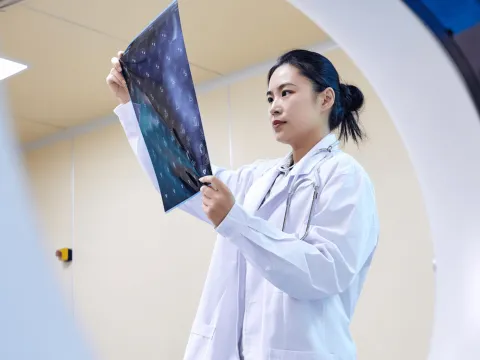- AdventHealth

Many people around the world are anxiously awaiting a COVID-19 vaccine, with distribution already underway for health care personnel and older adults — a process that ordinarily could take years, achieved in a matter of months. But not everyone feels that they are ready to receive the vaccine personally.
The quick development of the vaccines understandably raises questions about how a vaccine could be developed so quickly. And for some, particularly members of the Black community, the skepticism is justified, says Alric V. Simmonds Jr., MD, AdventHealth General Surgeon, Chief Health Equity Officer and Chief Medical Officer.
“Once the science behind the COVID-19 vaccination is understood, there shouldn’t be hesitancy or fear,” explains Dr. Simmonds.
One way the vaccine was developed and distributed so quickly was the use of messenger ribonucleic acid, or mRNA. “Technology has advanced, and this messenger RNA vaccination is one of those advances. The mRNA technology has allowed the companies who manufactured the vaccine to move at a much quicker pace in their development,” says Dr. Simmonds.
Several coronavirus vaccines are being made using synthetic mRNA, which drives protein production in cells to help defend the body against the virus.
What Is mRNA, and How Is It Used in Coronavirus Vaccines?
Some vaccine production methods for COVID-19 have been using mRNA to trigger the body’s immune system to produce protective antibodies without using the actual virus.
While vaccines for some other illnesses — such as the varicella (chickenpox) vaccine — actually use bits of the virus in the vaccine to create what’s called a “live virus vaccine,” the coronavirus vaccines being produced with mRNA do not contain any virus material, live or inactivated.
Instead, these coronavirus vaccines essentially work by using synthetic mRNA to direct the body to produce a small amount of the spike protein. Once the vaccinated person’s immune system detects this protein, their body begins producing protective antibodies to defend against coronavirus.
Experts say that the protective antibodies will recognize and prevent COVID-19 from getting into the body’s cells in the future, should that person be exposed to coronavirus.
“I am the chair of our scientific review committee for COVID-19,” says Dr. Simmonds. “We’ve had ample opportunity to really look at the scientific data — to look at the efficacy and the risk-benefit profile of this vaccination,” he explains, adding, “Quite honestly, I did have some initial hesitancy (about the coronavirus vaccine), but I am a scientist, and I believe in the science.”
What to Know About mRNA
This is the first time a synthetic mRNA vaccine is being widely distributed. The technology allows mRNA vaccines to be developed faster than traditional methods of vaccine development.
“Vaccinations help populations of people survive grave illnesses,” Dr. Simmonds explains. “If you’ve gone to school or if you’ve played team sports, you’ve been vaccinated for measles, mumps, chickenpox and other illnesses, so our bodies tolerate these things very well and they keep us safe.”
mRNA Isn’t a New Science
A Hungarian scientist named Katalin Karikó dedicated her time from the 1990s to today working toward mRNA use to fight diseases. In the 1990s, she was unable to gain a lot of support or funding because her ideas were so new and, some thought, hard to believe.
But, as the years have gone by, she and other scientists made more breakthroughs in research and experimenting, later being discovered by the (now) founders of BioNTech, the German partner of U.S. pharmaceutical companies Moderna and Pfizer.
mRNA Vaccines Are Here and They Shouldn’t Be Feared
With mRNA, what may look like a “new” advancement is actually science that’s been in the works for decades. Karikó is now the senior vice president at BioNTech, overseeing the mRNA work and research she started years ago, while major pharmaceutical companies have launched the first mRNA vaccines for widespread use.
For many people across the world who are waiting for life to get back to “normal,” this progress is a shining light at the end of the tunnel.
“We need people to get this vaccine so that the community can return to some sense of normalcy and achieve that herd immunity we’ve been talking about,” says Dr. Simmonds.
From Dr. Simmonds: The Bottom Line on mRNA Coronavirus Vaccines
“I understand why some people aren’t sure, but please don’t let your fear prevent you from taking a vaccination that will save you,” he says.
“If you do, you may end up like many of the patients who are in my ICU now, people whose families’ cannot be with them when they’re taking their last breath. Over 300,000 Americans, largely people who are brown and Latinx, have died of this disease. So, make the right choice, roll up your sleeve and get the shot.”
Sign Up for Coronavirus Vaccine Alerts
We are following the current vaccine distribution guidelines from the Centers for Disease Control and Prevention (CDC) and state governments. When the coronavirus vaccine is available to you, you’ll be able to schedule an appointment. For more information about when the vaccine will be available for you, we encourage you to sign up for email alerts at www.CoronavirusVaccineAlerts.com.
Recent Blogs

Learn more about women's sleep needs, including whether they need more than men, the negative effects of not getting enough and how to improve sleep overall.


